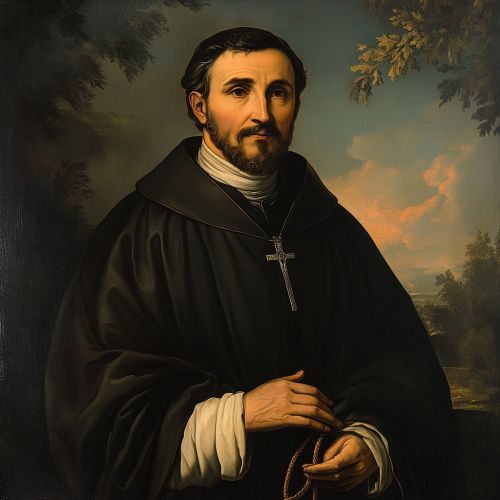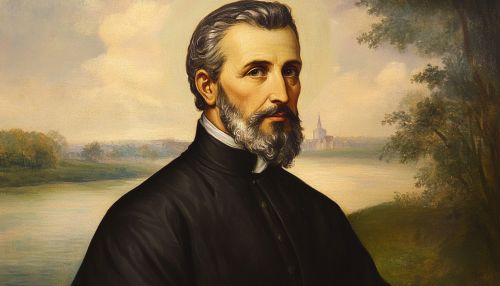Saint Vincent de Paul
Early Life and Education
Saint Vincent de Paul was born on April 24, 1581, in the village of Pouy, in the Kingdom of France, which is now known as Saint-Vincent-de-Paul, Landes. He was the third of six children in a peasant family. His parents, Jean de Paul and Bertrande de Moras, were farmers who worked hard to provide for their family. Despite their modest means, they recognized Vincent's intellectual potential and sent him to study with the Franciscans at Dax, where he showed great promise.
Vincent's early education was marked by a strong emphasis on Catholic doctrine and the humanities, which were typical of the time. His aptitude for learning led him to pursue higher education at the University of Toulouse, where he studied theology. During his time at the university, Vincent was ordained as a priest in 1600, at the age of 19, a testament to his dedication and the accelerated path he followed.
Captivity and Return
In 1605, while traveling from Marseille to Narbonne, Vincent was captured by Barbary pirates and taken to Tunis, where he was sold into slavery. This period of captivity lasted approximately two years and had a profound impact on his spiritual development. During his enslavement, Vincent was sold to several masters, one of whom was a renegade Christian who had converted to Islam. It was through Vincent's influence that this master eventually returned to Christianity, and together they escaped to France in 1607.
Upon his return to France, Vincent de Paul resumed his studies and continued his work as a priest. His experiences during captivity deepened his empathy for the suffering and marginalized, which would later become a cornerstone of his life's work.
Ministry and Charitable Work
Vincent de Paul's ministry was characterized by a profound commitment to the poor and disenfranchised. In 1617, he became the parish priest of Châtillon-les-Dombes, where he founded the "Confraternities of Charity," a lay organization dedicated to providing assistance to the needy. This initiative marked the beginning of Vincent's lifelong dedication to charitable work.
In 1625, Vincent founded the Congregation of the Mission, also known as the Vincentians or Lazarists, with the primary goal of evangelizing the rural poor and training clergy. The Vincentians emphasized the importance of living a simple life, focusing on service and humility. Vincent's approach to ministry was innovative for its time, as it involved both clergy and laypeople in the mission of the Church.


Collaboration with Louise de Marillac
A significant partnership in Vincent de Paul's life was with Louise de Marillac, a noblewoman who shared his commitment to serving the poor. Together, they founded the Daughters of Charity in 1633, a groundbreaking religious community of women dedicated to serving the sick and impoverished. Unlike traditional nuns, the Daughters of Charity did not live in cloisters but worked directly in the community, providing healthcare and education.
This collaboration was instrumental in expanding the reach of Vincent's charitable initiatives. The Daughters of Charity became one of the most influential religious communities in the world, known for their work in hospitals, orphanages, and schools.
Influence and Legacy
Saint Vincent de Paul's influence extended beyond his immediate charitable works. He played a crucial role in reforming the French clergy, advocating for higher standards of education and moral conduct. His efforts led to the establishment of seminaries and the improvement of clerical training, which had a lasting impact on the Catholic Church.
Vincent's legacy is also evident in the numerous organizations and societies that bear his name, including the Society of Saint Vincent de Paul, founded in 1833 by Frédéric Ozanam. This lay Catholic organization continues Vincent's mission of serving the poor and is active in over 150 countries.
Canonization and Veneration
Saint Vincent de Paul was canonized by Pope Clement XII on June 16, 1737. His feast day is celebrated on September 27, and he is venerated as the patron saint of charitable societies. His life and work continue to inspire countless individuals and organizations dedicated to social justice and humanitarian efforts.
